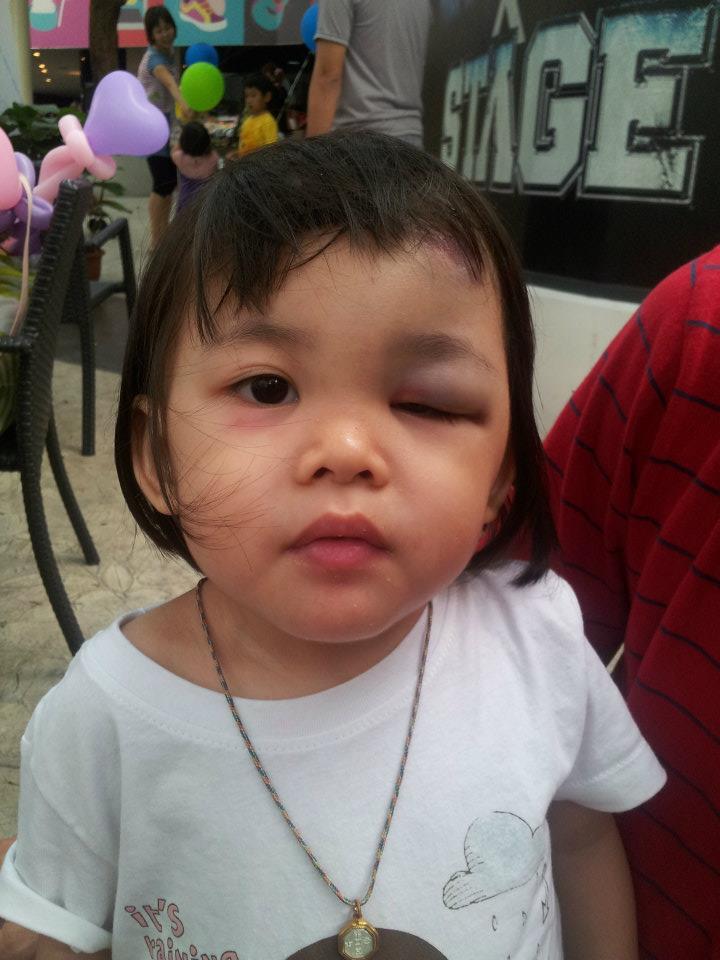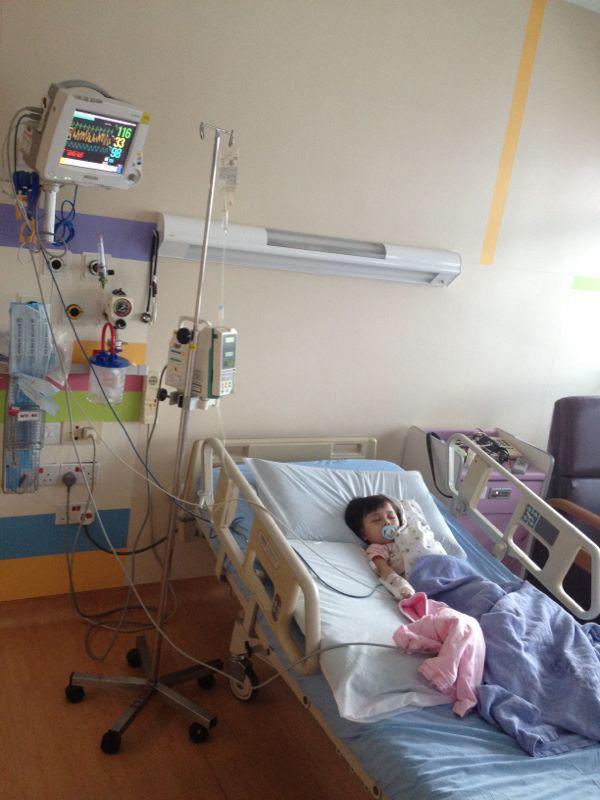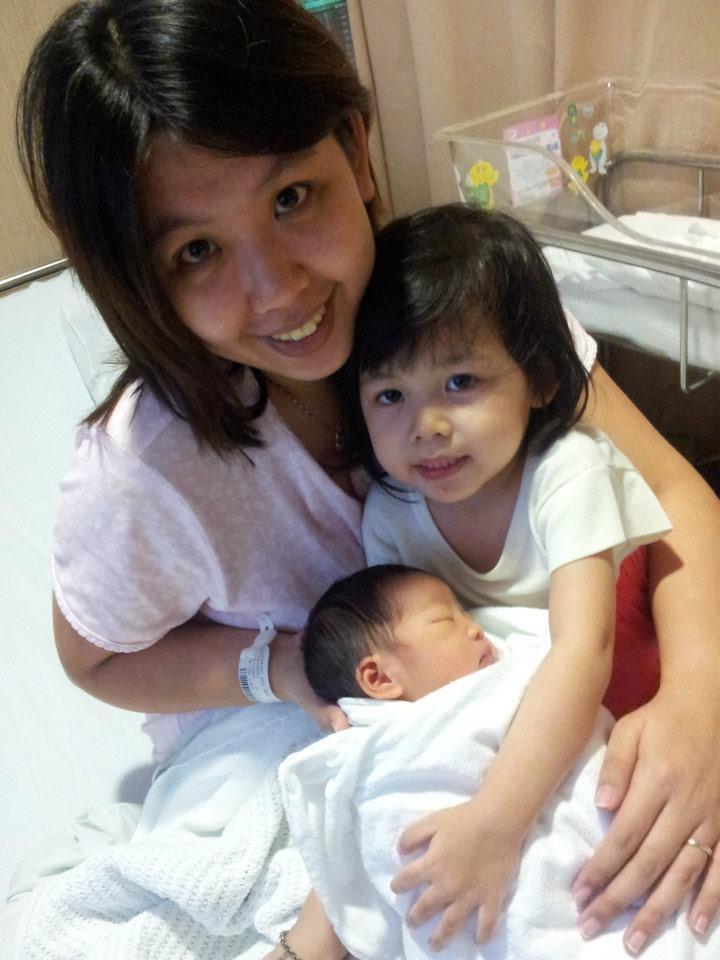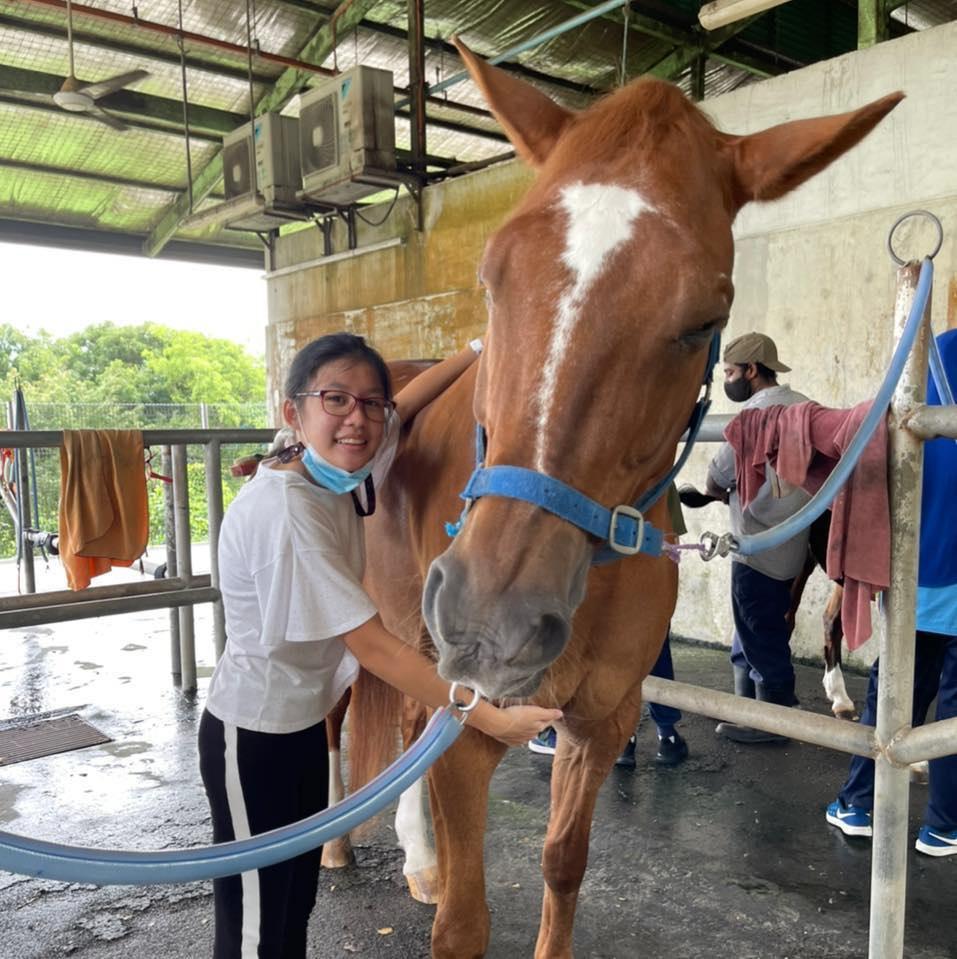Days after his second daughter was born, Avan Chew received news that his eldest daughter, Zecia, was diagnosed with a rare disease.
She was only three years old then.
It was all a blur, Avan told Mothership as he recalled that fateful week.
The couple was overcome with a mix of emotions — sadness, shock, and even amazement.
"I am normal. My wife is normal. So how come our daughter has a rare disease?" Avan remembered asking himself.
What led to the diagnosis?
When she was around two years old, Zecia was admitted to KK Women’s and Children’s Hospital (KKH) for seven days due to a bloated stomach, which had persisted for almost a year.
Doctors found that her blood platelet count was low, but the diagnosis was inconclusive. Revisiting his memories from those days, Avan said:
"Every day, doctors draw blood from Zecia, but they can’t provide an explanation for her bloated stomach. And they kept saying the same thing — that her platelet count was low. So I got frustrated after a while. On the seventh day, I told them that I didn’t want to wait anymore and I requested them to discharge her."
Despite visits to multiple doctors hoping to find an answer to Zecia’s bloated stomach, it was only a year later when the diagnosis came to light.
Zecia had suffered a bad fall, causing an injury to her head.
Her injury took a long time to heal and had even caused bruises around her eyes, which worried Avan and his wife.
 Zecia suffered bruises and swelling that took a long time to dissipate.
Zecia suffered bruises and swelling that took a long time to dissipate.
The young parents decided to then bring Zecia to see a family doctor, who sensed something wasn’t right and subsequently referred them to Associate Professor Tan Ee Shien, the head and senior consultant of Genetics Service at KKH.
Due to the similarities between Zecia’s symptoms of an enlarged spleen, bloated stomach and abnormal amount of bruising with Gaucher disease, a bone marrow test was performed to rule out other diseases.
"I can’t imagine what the pain was like for her at the age of three. That time, outside the ward, my wife and I could hear her cries when her blood was being drawn," Avan recalled.
This, according to Avan, happened only days after he and his wife welcomed their second child.
After receiving a negative result from the bone marrow test, a confirmatory genetic test for Gaucher disease was subsequently performed on Zecia.
"My wife was recently discharged after giving birth to our second daughter and then we were suddenly told that Zecia has Gaucher disease."
Gaucher disease
Speaking to Mothership, Tan explained that Gaucher disease is a rare genetic disorder.
Rare diseases are long-standing, life-threatening and progressively disabling conditions that affect a small percentage of the population and require multidisciplinary care.
Globally, there are more than 7,000 rare conditions.
Gaucher disease causes a deficiency of an enzyme known as glucocerebrosidase, which is key in breaking down certain fatty substances in the body.
Without this enzyme, fatty substances will accumulate in various organs and tissues and overtime, damage the body.
According to Tan, Gaucher disease occurs in about one in 40,000 to 60,000 live births globally.
The disease has no known cure and can be life-threatening, if the patient does not receive treatment.
Gaucher disease can be difficult to diagnose as it can mimic symptoms of more common diseases, Tan explained to Mothership.
"Gaucher disease is also not a well-known condition and therefore, it is hard to make a diagnosis if your index of suspicion is not high. For example, if the stomach feels distended and there is discomfort, most of the time we would consider a possible infection.
And even when the doctor detects that the spleen is enlarged, there are other conditions that are considered first, such as an infection, cancer or other blood related diseases. So it’s not always easy to reach the diagnosis."
As Avan and his wife eventually learnt, Gaucher disease also causes prolonged injuries and bruises as the patient's blood platelet count is extremely low.
 Zecia undergoing enzyme replacement therapy at KKH.
Zecia undergoing enzyme replacement therapy at KKH.
Now at 14 years of age, it has become a norm for Zecia to visit KKH every two weeks to undergo enzyme replacement therapy, which Tan stated is a "standard treatment" for Gaucher disease.
The therapy provides Zecia with an external source of the enzyme that is lacking in her body, and it is delivered via an intravenous (IV) infusion into her vein.
Zecia will have to undergo this treatment for the rest of her life.
 Zecia with her mother and younger sister.
Zecia with her mother and younger sister.
How has the disease affected her life?
As a result of the disease, Zecia’s school life is often disruptive, with her constant visits to the hospital.
Her academics has also suffered, according to Avan, who added that Gaucher disease can also affect Zecia’s brain cells and motor coordination.
According to Avan:
"If you talk about sports, like basketball or badminton for example, she would struggle because her coordination is not good. She won’t be able to pass the ball or aim well. I think in the future, she won’t be able to drive a car too."
While she still does some forms of physical activities, such as cycling and rollerblading, Zecia has to remain extra careful as any injuries to her body would take a long time to heal.
Despite it all, Zecia takes everything in stride and has remained "happy-go-lucky", Avan said.
"We just want her to have a normal life as much as other kids. From the outside, you can see that she’s just like any normal teenager," said Avan.
He shared that Zecia would spend her time making TikTok videos, baking, and rollerblading under the block whenever she can.
An early diagnosis has allowed Avan and his wife to have more time to make necessary arrangements to deal with Zecia’s illness – something that he felt somewhat relieved about.
 Despite her condition, Zecia retains her cheerful disposition.
Despite her condition, Zecia retains her cheerful disposition.
 Zecia enjoying herself with her family.
Zecia enjoying herself with her family.
Patients with Gaucher disease don’t just face medical challenges but also psychosocial ones, Tan shared with Mothership.
"There are complications of Gaucher disease including bone and neurological complications that are not fully treated by enzyme replacement therapy.
As the children get older, they are also more aware of their condition and will need to adapt and cope with the difficulties that come with having a disorder that few understand."
"Seeing how Zecia has improved over the years with treatment, I think the earlier we can diagnose a child, the better it is," said Tan.
Support for people with rare diseases in Singapore
Zecia is one of the beneficiaries for Rare Disorders Society Singapore (RDSS), an independent charity that serves children and families living with rare disorders.
Speaking to Mothership, Francesca Khor, the Fundraising and Sponsorship Manager for the Rare Disorders Society Singapore (RDSS), said that there are slightly more than 100 rare diseases listed in their registry, including Gaucher disease.
More crucially, the society also supports caregivers and parents of those with rare diseases with their social network.
"It is a very daunting path for new parents dealing with news of rare diseases, and it’s here that we try to find someone to share notes with, seek advice, or just allow a place for them to release any emotions. It’s a journey, and a very long one for most of the caregivers," said Khor.
As an independent charity that is not funded by the government, RDSS relies on public donations as well as non-financial support from organisations.
"The non-financial support is what keeps the wheels moving at RDSS. The team is in constant conversations with organisations in hopes to effect changes," Khor added.
About Takeda’s Symptom Matcher
Early diagnosis is key to helping patients receive the treatment that they need to alleviate their symptoms and maintain their quality of life.
To help accelerate the rare disease diagnosis journey for patients, Takeda has launched a Symptom Matcher tool, which uses artificial intelligence to analyse a variety of symptoms and determine their risk level of having an undiagnosed genetic condition, such as Gaucher disease.
The complimentary online tool guides users to answer general questions about themselves and their health, as well as the symptoms they are experiencing.
The tool finds genetic diseases that might explain some or all the presented symptoms.
At the end, users will receive a printout indicating their risk level of the disease, which they can take to a physician.
The Symptom Matcher website also provides a list of institutions with departments of genetic services that potential patients can get in touch with.
Visit IsitGaucher.sg to use the Symptom Matcher tool.
This article is sponsored by the “Are You Rare?” campaign, an educational campaign on rare diseases by the Rare Disorder Society Singapore (RDSS) and Takeda Pharmaceuticals (Asia Pacific) Pte. Ltd. It aims to raise awareness about rare diseases and accelerate the diagnosis of patients with Gaucher disease and Fabry disease.
The campaign also aims to rally support for the rare disease community in Singapore. Learn more about the campaign here.
All images via KK Women's and Children's Hospital/YouTube video.
This information is available for public information purposes only; it should not be used for diagnosing or treating a health problem or disease. It is not intended to substitute consultation with a healthcare provider. Please consult your healthcare provider for advice.
If you like what you read, follow us on Facebook, Instagram, Twitter and Telegram to get the latest updates.
